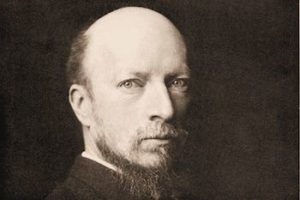
Felix Adler
*Felix Adler was born on this date in 1851. He was a white Jewish-American professor, rationalist, lecturer, and social reformer.
Felix Adler was born in Alzey, Rhenish Hesse, Grand Duchy of Hesse, Germany, the son of a rabbi, Samuel Adler, a leading figure in European Reform Judaism. The family immigrated to the United States from Germany when Felix was six so his father could accept the appointment as head rabbi at Temple Emanu-El in New York.
Adler attended Columbia Grammar School and graduated with honors from Columbia University in 1870. He continued at Heidelberg University, where he studied as part of his training to become a rabbi. He received a Ph.D. from Heidelberg in 1873. While in Germany, he was strongly influenced by neo-Kantianism, especially the notions that one cannot prove or disprove the existence of a deity or immortality and that morality can be established independently of theology.
Adler's social philosophy opposed commercialism. He claimed, "The root disease that afflicts the world at the present day is the supremacy of the commercial point of view." His thought prized public works and the use of reason to develop ultimate ethical standards. Adler published such works as Creed and Deed (1878), Moral Instruction of Children (1892), Life and Destiny (1905), The Religion of Duty (1906), Essentials of Spirituality (1908), An Ethical Philosophy of Life (1918), The Reconstruction of the Spiritual Ideal (1925), and Our Part in this World.
He used ideas from Judaism and the philosophies of Kant and Ralph Waldo Emerson, mixed with certain socialist ideas of his time. He believed that the concept of a "personal god" was unnecessary and thought that the human personality was the central force of religion. He believed that different people's interpretations of religions were to be respected as religious in themselves. The Ethical Culture movement was open to people of diverse beliefs. Ethical Culture societies were formed in the late nineteenth century in numerous cities in the United States, for instance, Philadelphia and St. Louis.
Adler was the founding chairman of the National Child Labor Committee in 1904. Lewis Hine was hired as the committee's photographer in 1908. In 1911, he put together the First Universal Races Congress in London. In 1917 Adler served on the Civil Liberties Bureau, which later became the American Civil Liberties Bureau and then the American Civil Liberties Union (ACLU). In 1928 he became president of the Eastern division of the American Philosophical Association. He served on the first Executive Board of the National Urban League. Felix Adler, who founded the Ethical Culture movement, died on April 24, 1933.